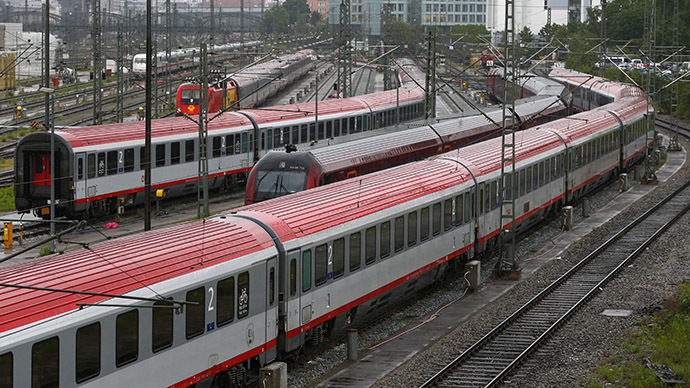Germany hit by 9th strike by train drivers in 10 months

Millions of German rail passengers were struggling to get from A to B on Wednesday after the German Railway Union (GDL) started a new mass strike following a failed round of pay negotiations with state railway operator Deutsche Bahn.
Two in three long-distance trains were canceled thanks to the
strike, and hundreds of commuter services were also halted. Large
crowds in train stations and traffic jams on highways were the
natural result.
Deutsche Bahn warned passengers about the strike disruption on
its website. The union’s leadership has not yet announced the
strike end date.
GDL is demanding a 5 percent pay raise, as well as a reduction in
working hours from 39 to 37 per week. Deutsche Bahn has offered a
4.7 percent wage raise, but without any reduction in working
hours.
“For 10 years, there weren’t hardly any wage increases. And
now the economy is booming like hell and people want a piece of
the cake,” economist Michael Mross told RT.
The ongoing strike, which started Wednesday evening, is the ninth
in the past 10 months.
“There has been so much strike action because people feel
they have to defend themselves from frozen wages and demand
better salaries and working conditions. Some people made millions
from these companies so it’s time these profits were distributed
fairly,” said Heike Hansel, an MP for the Left party.
Chancellor Angela Merkel has called on the conflicting parties to
enter mediation, as industry is estimating the possible damage
from the walkout at up to 100 million euros ($110 million),
according to Reuters.
“This strike will hurt certain parts of the economy that are
dependent on rail,” said Gunnar Gburek, a logistics
specialist at Germany’s professional association for buyers and
logistics, BME. “It’s not only financial. It also hurts rail
as a brand. People might think twice in the future about using
trains to transport goods.”
READ MORE: Lufthansa pilots’ strike leaves 200,000 stranded after weekend train chaos
Already in 2015, twice as many working days have been lost to industrial action than in the whole of the previous year.
“GDL is taking Deutsche Bahn customers hostage for egotistical reasons to get more power," said Ingo Kramer, president of Germany's BDA employers' association, dpa news agency reported.
GDL has been criticized for its action, not only by businesses
and government, but also by the Confederation of German Trade
Unions (DGB).
“I doubt that a man who still has not achieved his goal after
eight strikes in a row is really interested in any other
alternative than another strike,” said Reiner Hoffmann, the
head of the DGB, referring to Klaus Weselsky, the head of the
GDL, Tagesspiegel reported.
The mood for a walkout is meanwhile not just limited to the
German railway industry. Metal workers, kindergarten teachers,
and employees of electronics giant Siemens have all taken strike
action in the last five months.












